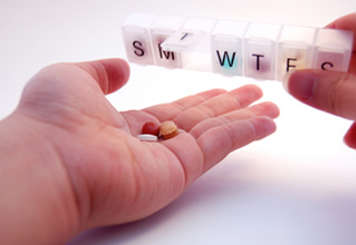
Preventing the spread of germs or medications
- Wash your hands before preparing medication doses or re-stocking your medicine organizer (dosette or pill box).
- Create a clean, safe area where you can prepare your doses, for example your kitchen counter or bedroom desk.
- Wash hands right after taking your medications so that you do not accidentally spread medicine particles to your eyes or mouth or other surfaces in your home. This is especially important with immunosuppressant (anti-rejection) medicines. You will learn about these medications later in this module.
- Wash syringes right away with soap and warm water (to stop the sugars in the liquids from making the syringes very sticky!). Let the syringes air dry on a clean towel.
- Some of your medications are considered to be cytotoxic, or harmful. There are special reasons for giving these medications to patients after transplant, but you need to handle them very carefully. Your transplant team will explain how to handle and use these medications safely.
Storing medications
- Store room-temperature medications in a cool, dry place away from sunlight. Never store medications in the bathroom. They can be damaged by the heat and humidity that build up from using hot water. For similar reasons, do not store medicines near heat sources in the kitchen.
- Store medicines away from children and pets. Consider using a locked medicine box or a high shelf to keep them out of reach.
- Store refrigerated medications on a fridge shelf that small children cannot easily reach. Consider putting any medication bottles into a same-size plastic (Tupperware® style) container. This will hide the medication from curious children and help prevent the bottle from falling over if it is bumped.
- Do not store medications in the door of the fridge, as the temperature often changes in this area.
- Call your local poison information centre if anyone else takes your medications. If you live in Ontario, call the Ontario Poison Centre. The calls are free.
- Call 416-813-5900 if you live in Toronto.
- Call 1-800-268-9017 if you live somewhere else in Ontario.
- Plan to carry your medications safely when you are away from home (for example when coming to clinic). Use a small back-pack or cooler bag (with an ice pack for medications that need to be kept cool). Some teens prefer to use a locked plastic box when they are away from home.
You can get more information on storing and carrying medication on each medication page and on the page about travel after a transplant.
Disposing (getting rid) of medicines
- Take any medications that have expired or that you are no longer taking to your local pharmacy. The pharmacist will get rid of them safely for you.
- Do not pour outdated or unused liquid medication down the sink or toilet.
- Do not throw outdated or unused medicine in the garbage or recycling bin.






